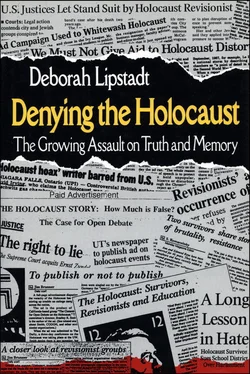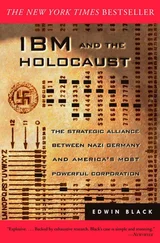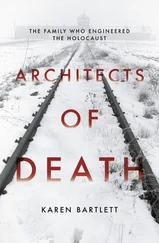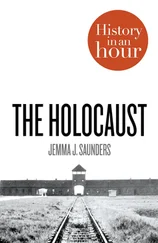The memorial stone at Auschwitz lists the number of victims of the camp as 4 million. Research now indicates that the number of people who died in the Auschwitz/Birkenau gas chambers was between 1.5 and 2 million, of whom 85 to 90 percent were Jews.
The papers discussed in this chapter function as private newspapers. The courts have broadly defined their editorial discretion to accept or reject ads. In situations of “state action,” where a state university administration controls the newspaper’s content, the courts may prohibit content-based rejection of the ads. Discretion of Student Editors to Accept or Reject Holocaust Revisionist Advertisements (ADL Legal Affairs Dept., Feb. 1992).
In 1931, in Near v. Minnesota, the Supreme Court struck down a state attempt to gag a paper’s freedom to publish “malicious, scandalous or defamatory” material. Fred W. Friendly, Minnesota Rag (New York, 1981).
The Tufts Daily was the only paper that decided to run portions of the ad. Its editors voiced the opinion that it was necessary to run the ad so that readers could “fully comprehend” the deniers’ arguments and then make “informed judgments” and engage in “active dialogue” about “complex issues.” They reached that conclusion despite their conviction that Smith’s views had little if any “legitimacy” and were filled with “hateful sentiments and ideas that defile the memories” of the millions killed in World War II. To have rejected it would have “unilaterally censored” the campus community from the issue. Tufts joined other campuses in falling prey to the light-of-day argument: In search of a principled stand, they gave Smith exactly the exposure he sought.
At the meeting one of the editors of the paper, an African American, stood up and said that while he could not personally know what it felt like to lose so many of one’s coreligionists in the Holocaust, he “knew” the pain of slavery. He would fight anyone’s attempt to deny that. Consequently he felt obligated to fight this attempt at denial.
He also turned to Murphy and said that he understood that one of Murphy’s objections was that it was infantilizing to prevent the students from deciding on the contents of the ad themselves. He wondered if it was not equally infantilizing to tell an entire editorial board to publish something whose publication it uniformly opposed.
The deniers have cited these contentions, which have been subjected to serious historical and methodological critiques, to support their claims that whatever atrocities the Nazis committed, those committed by the Allies were worse.
The full text of the resolution read “As we approach the fiftieth anniversary of the downfall of the Nazi regime in 1995, the American Historical Association calls attention to the need to initiate plans now to encourage study of the significance of the Holocaust. To that end the association will make available the names of experts on the history of the event.” Chronicle of Higher Education, January 8, 1992.
Countries such as the United States, where the degree of ignorance about historical matters is legendary, are particularly susceptible to this kind of rewriting of history. In 1990 only 45 percent of Alabama high school seniors knew that the Holocaust was the Nazi attempt to exterminate the Jews. It is telling that many of those who gave the wrong answer thought that the United States had committed the Holocaust against the Japanese with the bombing of Hiroshima and Nagasaki ( Birmingham, Alabama, News, Aug. 12, 1990).
The same kind of rehabilitation is evident in France among the highest reaches of the political and judicial establishment. President François Mitterrand recently had a wreath placed on the grave of the Vichy leader, Marshal Philippe Pétain, who collaborated with Nazi Germany and was directly responsible for the deportation of thousands of Jews. Pétain, who in World War I was commander in chief of the French forces, was convicted of treason by a French court in 1945. Mitterrand insisted in a radio interview that present-day France should not be held responsible for the crimes of the Vichy regime. While the contemporary French government does not bear “guilt” for Vichy’s actions, honoring one of the perpetrators with a presidential wreath sends a revisionist message to the population at large. It revises the historical perception of France’s role in the Holocaust. It can, and already has, become part of a historical whitewash.
Another form of French historical revisionism has been the refusal of French courts to try Vichy war criminals for their actions. The courts have thrown out these indictments, though the Supreme Court recently reinstated one of them. Thus far no citizen of France has been tried for crimes against humanity ( Jewish Telegraphic Agency, Nov. 23, Dec. 2, 1992).
This tactic was evident in the 1992 attempt of the Cincinnati Ku Klux Klan to erect a cross on city property during the Christmas season. They claimed it was part of their campaign to remind Cincinnatians of the religious significance of the holiday. It was a way for the Klan to present itself as more than just a racist organization.
It will prove particularly true for those beset by what my colleague David Blumenthal has termed “alterphobia”—the fear of the other. The other may be homosexuals, women, foreigners, Jews, people of color, or all of the above.
Having written this book in the shadow of the “industry” that produces these shows, I recognize that of all my calls for action, this one has the least possibility of realization.
Charges may again be brought against Zundel on the basis of his having incited hatred against Jews.
Because the dimensions of the “doors” were thirty by forty centimeters, Pressac hypothesizes that they were probably shutters rather than doors.
The traditional notation of who had actually done the drawing and who had signed off on it is chilling in both its ordinariness and extraordinariness. The drawing was completed by prisoner 63003 (whose name remains unknown) on March 23, 1944. We know that it was reviewed by a civilian worker named Techmann and approved the next day by SS Lieutenant Werner Jothan.
The Secret Annex was the name Anne gave to the family’s hiding place.
Even after the diary was published to wide acclaim in Europe, American publishers were wary. Ten rejected it before Doubleday published it in 1951. It was an immediate success.
In fact, in 1973 he wrote a book, The Obsession, about the entire episode.
Dumas Malone, The Sage of Monticello: Jefferson and His Time, vol. 6 (Boston, 1981), pp. 417–18.
Marvin Perry, “Denying the Holocaust: History as Myth and Delusion,” Encore American and Worldwide News, Sept. 1981, pp. 28–33.
For an example of this see how the deniers have treated Anne Frank’s diary. David Barnouw and Gerrold van der Stroom, eds., The Diary of Anne Frank: The Critical Edition (New York, 1989), pp. 91–101.
Читать дальше












